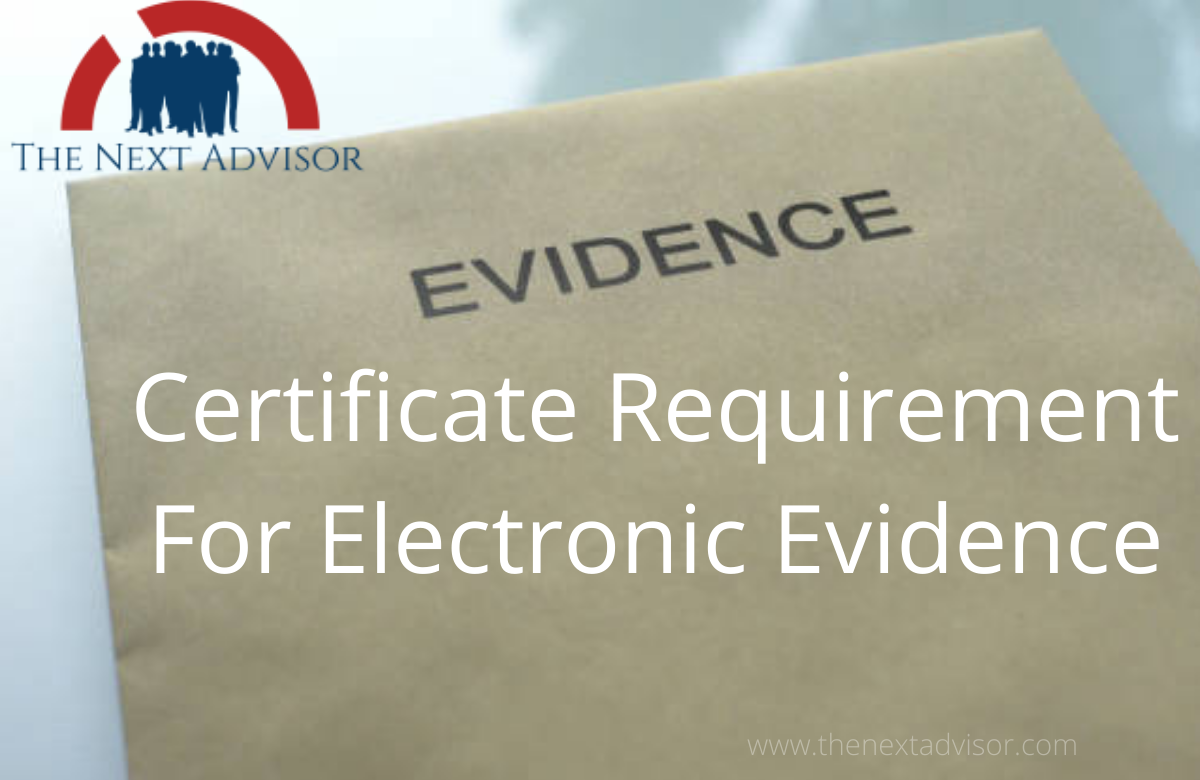Certificate Requirement For Electronic Evidence, is necessary or not? We can get the answer to this question in the case named Arjun Kotkar Vs Kailash Kushanrao, 2000. Let us see the judgment of this case and the view of the court on whether the certificate requirement for electric evidence is necessary or not?
Section 65B in The Indian Evidence Act, 1872
65B. Admissibility of electronic records.- and Certificate Requirement For Electronic Evidence.
(4)In any proceedings where it is desired to give a statement in evidence by virtue of this section, a certificate doing any of the following things, that is to say, –
(a) identifying the electronic record containing the statement and describing the manner in which it was produced;
(b) giving such particulars of any device involved in the production of that electronic record as may be appropriate for the purpose of showing that the electronic record was produced by a computer;
(c) dealing with any of the matters to which the conditions mentioned in sub-section (2) relate, and purporting to be signed by a person occupying a responsible official position in relation to the operation of the relevant device or the management of the relevant activities (whichever is appropriate) shall be evidence of any matter stated in the certificate; and for the purposes of this subsection, it shall be sufficient for a matter to be stated to the best of the knowledge and belief of the person stating it.
HISTORY behind Certificate Requirement For Electronic Evidence
Anvar P.V. v P.K. Basheer Mohammad v State of Himachal Pradesh:- 3 Judge Bench
It was observed that an electronic record by way of secondary evidence shall not be admitted in evidence unless the It was held, a party who is not in possession of the device from which the electronic document is requirements under Section 65-B are satisfied. Thus, in the case of CD, VCD, chip, etc., the same shall be accompanied by the certificate in terms of Section 65-B obtained at the time of taking the document, without which, the secondary evidence pertaining to that electronic record, is inadmissible, it was held.
Shafhi Mohammad Vs State of Himachal Pradesh:- 2 Judge Bench
It was held, that a party who is not in possession device from which the electronic document was produced, cannot be required to produce a certificate, under Section 65(B) of the Evidence Act. In that case, the bench was considering the issue of whether videography of the scene of crime or scene of recovery during the investigation should be necessary to inspire confidence in the evidence collected.
Present Case is Arjun Versus Kailash
A three-Judge Bench of the Supreme Court comprising Justices RF Nariman, S Ravindra Bhat, and V Ramasubrama nian delivered its judgment on a reference to the question “Is the requirement of certificate U/s 65-B(4) Evidence Act mandatory for production of electronic evidence? Certificate Requirement For Electronic Evidence is necessary or not?
JUDGEMENT
The required certificate under Section 65B(4) is unnecessary if the original document itself is produced.
“This can be done by the owner of a laptop computer, computer tablet, or even a mobile phone, by stepping into the witness box and proving that the concerned device, on which the original information is first stored, is owned and/or operated by him. In cases where the “computer” happens to be a part of a “computer system” or “computer network” and it becomes impossible to physically bring such system or network to the Court, then the only means of providing the information contained in such electronic record can be in accordance with Section 65B(1), together with the requisite certificate under Section 65B(4).
Application Can Be Made To Court When Requisite Person Refuses To Issue Such Certificate?
The court observed that the major premise of Shafhi Mohammad that such certificate cannot be secured by persons who are not in possession of an electronic device is wholly incorrect. An application can always be made to a Judge for the production of such a certificate from the requisite person under Section 65B(4) in cases in which such person is a third person.
The Court may in appropriate cases allow the prosecution to produce such a certificate at a later point in time.
When it comes to criminal trials, it is important to keep in mind the general principle that the accused must be supplied with all documents that the prosecution seeks to rely upon before commencement of the trial, under the relevant sections of the CrPC.
Depending on the facts of each case, and the Court exercising discretion after seeing that the accused is not prejudiced by want of a fair trial, the Court may in appropriate cases allow the prosecution to produce such certificate at a later point in time. If it is the accused who desires to produce the requisite certificate as part of his defence, this again will depend upon the justice of the case – discretion to be exercised by the Court in accordance with the law.
The bench comprising of Justices RF Nariman, S. Ravindra Bhat, and V. Ramasubramaniam observed that a Court may in appropriate cases allow the prosecution to produce such certificate at a later point in time.
The court observed thus holding that the certificate required under Section 65B(4) is a condition precedent to the admissibility of evidence by way of the electronic record.

























